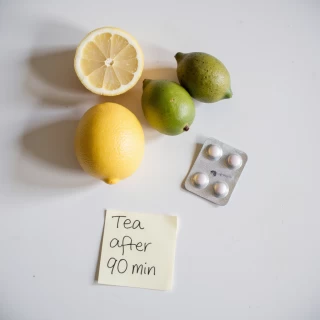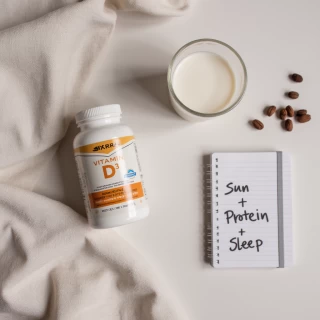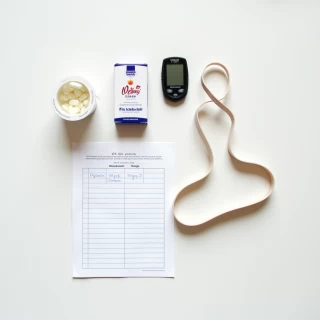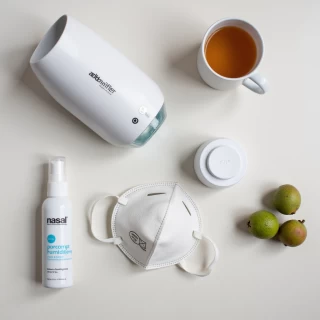
- 13th November 2025
Table of Contents
- 7-Day GERD Reset Plan for Delhi Winters
- A) 7-Day GERD Reset Plan
- B) What to Eat in Winters When You Have GERD
- C) Winter Drinks: What Helps vs What Harms GERD
- D) Office Routine: How Delhi Professionals Can Reduce Acidity Without Quitting Their Job
- E) Night Routine: Protecting the Esophagus While You Sleep
- F) Simple Symptom-Check: Is Your GERD Improving Over 7 Days?
- Common Mistakes, When to Test, Office & Senior Checklists, and Next Steps
Every winter in Delhi–NCR, I see a sharp rise in patients who say, “Doctor, my acidity has become unbearable,” “I wake up with burning in my throat,” or “Even normal food causes heaviness now.” While GERD (Gastroesophageal Reflux Disease) affects people year-round, it becomes noticeably worse from November to February. This isn’t just because we eat more fried or spicy foods during winter. The cold itself, the way Delhiites change their routine, and even the seasonal drop in Vitamin D all contribute to increased acidity and reflux.
For general adults and especially office-going professionals, colder months introduce a combination of late-night eating, more tea and coffee, tight winter clothing, reduced activity, inadequate water intake, poor sleep, and higher stress. Together, these factors weaken the lower esophageal sphincter (LES), slow digestion, and increase acid production.
A) Cold Weather Slows Digestion – The Hidden Culprit Behind Winter Acidity
The human digestive system works optimally when the body is warm. As outside temperatures fall, your body diverts more energy toward maintaining core warmth rather than supporting smooth digestion. This means:
- Gastric emptying slows — food stays in the stomach longer, creating heaviness, belching, and regurgitation.
- Acid secretion increases — cold exposure can stimulate vagal tone, which increases acid output.
- LES (the acid valve) becomes lazier — making it easier for acid to travel upward, especially after meals.
- Bloating increases — gas gets trapped more easily, worsening reflux symptoms.
This is why many people feel more “full,” “tight,” or “bloated” in winters even after normal meals. And this feeling is worse for office workers who sit long hours in heated, closed environments with minimal movement.
B) Why Delhi Office Workers Face the Worst GERD Flares in Winter
Office workers in Delhi–NCR typically experience a triple combination that worsens acidity between November and February:
- Increased tea/coffee intake — 3–5 cups a day to stay warm, but caffeine weakens the LES and increases acid.
- Long sitting hours — compressed abdomen → increased reflux.
- Late meals — leaving office late + winter appetite surges → late heavy dinners → night reflux.
- Insufficient water intake — dehydration thickens stomach acid.
- Heaters reduce humidity — dry air irritates the throat, making acidity feel worse.
Most people don't realise that evening acidity is often a direct result of the day’s routine, not just one meal.
C) Delhi Winter GERD Triggers vs Fixes
D) Delhi Winters and the “Acidity Cycle”: Why Symptoms Get Worse Weekly
GERD symptoms snowball if not corrected early. With each week of winter, the following sequence becomes more pronounced:
- Cold reduces digestion → heaviness increases.
- People increase tea/coffee for warmth → more acid.
- Heaters cause dryness → throat irritation feels like “more acidity”.
- Poor sleep worsens gastric sensitivity.
- Reflux episodes increase → inflammation increases.
This is why many people in NCR feel “I didn’t have acidity the whole year — why now?” The winter lifestyle becomes the environmental trigger.
E) The Post-Meal Slump: Why Delhiites Feel Burn More at Night
Night-time acidity is the most common complaint in my clinic during winters. The reasons are surprisingly consistent across patients:
- Dinner happens late due to traffic and long office hours.
- People choose heavy meals: parathas, fried starters, paneer dishes, biryanis.
- Sitting or lying down soon after meals worsens reflux.
- Cold slows gastric emptying significantly in evenings.
- Many drink tea/coffee even after 5 pm.
For some people, night GERD even mimics heart symptoms — chest tightness, burning, throat discomfort — causing unnecessary anxiety.
I have set the foundation by explaining exactly why winter triggers acidity for Delhi adults and office workers. In Batch 2, I’ll give the complete 7-day acid-calm routine, smog-safe meal patterns, winter-friendly drinks, and padded lifestyle checklists.
7-Day GERD Reset Plan for Delhi Winters
If your acidity and GERD symptoms spike every winter in Delhi–NCR, you do not necessarily need an extreme diet. Most people improve significantly when they follow a structured 7-day reset that aligns food timing, meal composition, posture, hydration, and sleep with the reality of cold weather and office life.
The goal of this 7-day plan is simple: reduce acid load, protect the esophagus, prevent large reflux episodes, and calm the system so the stomach can start behaving more predictably again.
A) 7-Day GERD Reset Plan
You can start this plan any day of the week. It is designed for general adults and office workers with mild to moderate GERD symptoms. People with severe chest pain, weight loss, vomiting, or black stools should seek medical evaluation first.
Most patients report a noticeable reduction in burning, heaviness, and post-meal discomfort within 4–7 days if they follow this consistently and avoid major dietary excesses.
B) What to Eat in Winters When You Have GERD
Many Delhiites think GERD means “boiled bland food.” That is rarely necessary. The real key is to avoid heavy, oily, very spicy, and very late meals. Here are winter-friendly, Indian, practical combinations that are usually better tolerated.
Note: These are general options. Individual tolerances vary. Some people react to curd, others to onion/garlic or raw salad. Track your body’s response and adjust.
C) Winter Drinks: What Helps vs What Harms GERD
In Delhi winters, most of us increase hot beverages. Unfortunately, not all warm drinks are GERD-friendly.
As a rule, if a drink is very strong, very sweet, or combined with heavy snacks, it is more likely to aggravate acidity.
D) Office Routine: How Delhi Professionals Can Reduce Acidity Without Quitting Their Job
You do not need a “perfect” routine to reduce GERD. You need a repeatable office routine that fits real life in NCR.
- Breakfast before leaving: Avoid starting the day with only tea and biscuits. Eat something soft and warm.
- Limit caffeine to earlier half of the day: Try to keep tea/coffee before 2–3 pm, not late evening.
- Water strategy: Keep a flask of warm water at your desk. Sip small amounts every 30–45 minutes.
- Post-lunch movement: Walk 5–10 minutes after lunch instead of lying down or slouching in the chair.
- Snack smart: If hungry at 5–6 pm, choose nuts, roasted chana, light poha, or fruit instead of fried snacks.
- Sit tall after meals: Keep your upper body upright for at least 30–40 minutes after eating.
Small shifts like these reduce mechanical reflux (acid physically flowing up due to pressure and posture) more than most people realise.
E) Night Routine: Protecting the Esophagus While You Sleep
Night-time is when GERD causes maximum damage, because acid can stay in contact with the esophagus for longer. A simple, consistent night routine is one of the most important parts of this 7-day reset.
- Dinner timing: Aim to finish by 8:00–8:30 pm. If that is impossible, at least keep the last meal lighter and smaller.
- Meal composition: Prefer khichdi, soft roti + dal + sabzi, or light upma over heavy gravies, oily parathas, and fried starters.
- Post-meal posture: Sit upright or go for a slow 5–10 minute indoor walk. Avoid bending forward to clean, lift, or pack immediately.
- Head elevation: In frequent night reflux, raising the head end of the bed slightly (with blocks under the legs of the bed, not extra pillows under the neck) can help reduce backflow.
- Screen curfew: Stop intense work or scrolling 60–90 minutes before bed. Blue light, stress, and late-night arguments all worsen GERD via the nervous system.
- Breathing or relaxation: 5–10 minutes of slow breathing or a simple relaxation routine reduces stress-mediated acid production.
Many Delhi patients notice that when they combine earlier, lighter dinners with head elevation and less screen time, their night-time burning and throat issues reduce significantly within a week.
F) Simple Symptom-Check: Is Your GERD Improving Over 7 Days?
As you follow this 7-day GERD reset, monitor these changes instead of relying on memory or guesswork.
If there is clear improvement, it means your lifestyle and winter routine are major drivers and can be managed well. If there is no improvement or symptoms worsen, medical review is important to rule out other conditions.
Bottom line: You don’t need an extreme winter detox or exclusively bland food to control GERD in Delhi. You need a structured 7-day reset with better timing, gentler meals, smarter drinks, improved office posture, and a protective night routine. This creates a strong base for the next step.
Common Mistakes, When to Test, Office & Senior Checklists, and Next Steps
By now you know why winter in Delhi–NCR pushes acidity and GERD out of control, and how a 7-day reset can calm your system. In this final part, I want to help you avoid the most common mistakes I see in clinic, understand when you actually need tests, and give you screenshot-friendly checklists for office workers and seniors.
G) 10 Common Winter GERD Mistakes Delhiites Keep Repeating
Most patients do not worsen their acidity because of one big wrong step, but because of many small daily mistakes. When you correct these, medicines work better and often you need less of them in the long term.
- Only taking antacids, not changing timing: Gel or tablets give temporary comfort but do not correct late dinners or lying down after food.
- Skipping breakfast, then overeating at lunch: Long fasting followed by a large meal is a classic trigger for severe acidity.
- Multiple strong teas/coffees “for warmth”: Caffeine relaxes the LES and increases acid; more cups often equals more reflux.
- Drinking very less water in winter: Dehydration concentrates stomach acid and worsens burning and heaviness.
- Using very tight belts or shapewear: High waistbands and tight clothing around the stomach physically push acid upwards.
- Finishing dinner late with fried or spicy foods: This combination almost guarantees night-time reflux for many adults.
- Lying down immediately after eating: Watching TV in a reclined position or sleeping soon after dinner makes reflux more frequent and severe.
- Over-relying on “home remedies” but ignoring red-flag symptoms: Not all burning is harmless; some signs need proper testing.
- Self-starting strong medicines without guidance: Random use of high-dose acid suppressants without evaluation can hide important diagnoses.
- Assuming GERD is purely “gastric” and not linked to stress or sleep: The brain–gut axis is very real; poor sleep and high stress make GERD significantly worse.
H) When Should You Get Tests for Acidity? A Simple Decision Guide
Not everyone with acidity needs endoscopy or many blood tests. At the same time, some patients delay evaluation even when warning signs are present. Here is a simple, practical way to think about testing. This is general guidance and does not replace personalised medical advice.
Important: Testing decisions are individual. This guide is for awareness, not self-diagnosis. Always discuss your symptoms with a doctor who can see your full clinical picture.
I) Office GERD Control Checklist for Delhi Professionals
This table is designed for office workers in Delhi–NCR who struggle with daytime or evening acidity. You can print it or keep it on your phone.
J) Winter GERD Care Checklist for Seniors in Delhi–NCR
Seniors often have slower digestion, more medicines, and other health conditions. This checklist can help families support them better in cold months.
K) When You Need a Personalised Plan, Not Just Generic GERD Tips
No two GERD cases in Delhi–NCR are exactly the same. Some are driven mainly by late-night work and stress, some by food patterns, and some by medicines or other health conditions. A short, structured consultation often saves months of trial and error.
- If you have long-standing acidity or are on regular acid-suppressing medicines.
- If your symptoms come back every winter despite taking care of food.
- If you also have diabetes, fatty liver, or weight issues along with GERD.
In my Lifestyle Modification Program, we do not treat acidity in isolation. We look at your full routine, meal pattern, work timing, sleep, medicines, and weight to design a realistic plan.
You can read more about why this approach works for busy adults here: Why the Lifestyle Modification Program Works and also explore my Portfolio and About pages.
If you feel your acidity is controlling your day or disturbing your sleep every week, you can book an online or in-clinic consultation on HealthPlix and we will work out a winter-specific GERD strategy for you.
Disclaimer: This article is for education and awareness for adults in Delhi–NCR. It does not replace a personalised consultation, diagnosis, or treatment plan. If you have chest pain, difficulty swallowing, vomiting, black stools, or unintentional weight loss, seek medical care without delay.














